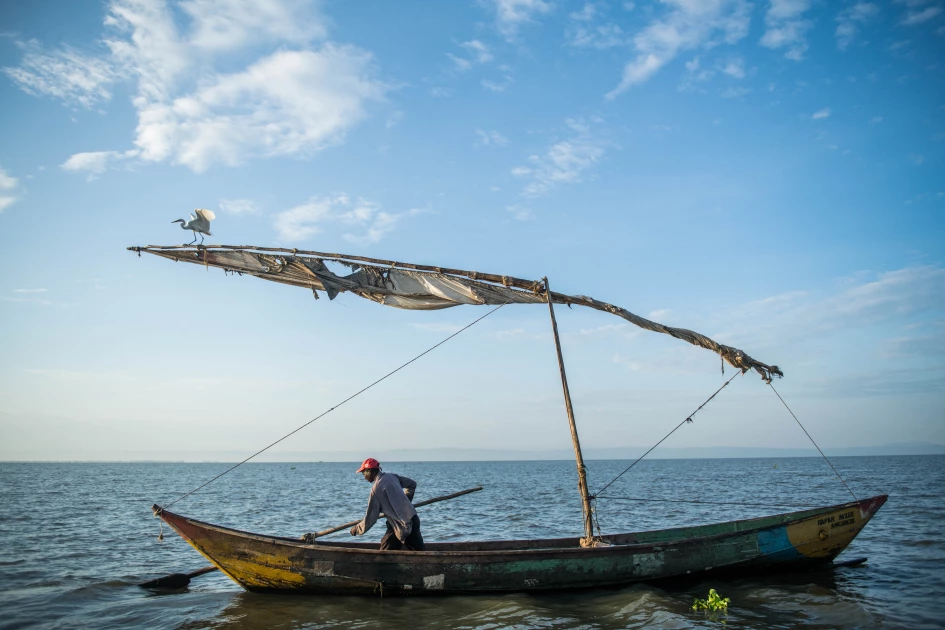BWIRE: There is urgent need to put the interest of fish farmers on national agenda

A fisherman in action on a boat on Lake Victoria in Kisumu, Kenya on June 22, 2023. (Photo by Gerald Anderson / ANADOLU AGENCY / Anadolu Agency via AFP)

Audio By Vocalize
Fishermen in Busia County are counting loses after over 150 cages experienced fish kill the following the devastation effects of what authorities are blaming on upwelling which forced the bottom waters to move on top and poor quality of water related to high number of mollusks that led to low oxygen.
The most affected areas are Mulukoba, Rudacho, Bumbe and Busembe beaches. In addition, the authorities indicate was exacerbated by the placement of cages in shallow depths and near each other. Other stakeholders blame it on the increasing pollution of the lake by both commercial and domestic deposit of wastes into the lake.
However, if there was an existing functioning early warning system already, the lake water had shown a brown colouration and had foul smell, killed the fish on diverse dates along Marenga, Mulukoba and Rudacho, Sisenye, Bumbe, Busembe, Busijo, Mutarakhunga and Sio Port beaches, the loses could have been minimized.
The farmers could have quickly harvested and sold even the immature though storage could also have been a problem. We always blame the victims when such calamities happen, yet this could have been mitigated should the numerous bodies existing in the sector have been functional.
Kaliro as we commonly refer to the heating of Lake water in the region is not new, and affects fish including those outside cages, which can run away to safety on noticing changes in temperatures but given the current heavy investment by farmers and the County Governments in the sector through commercial fishing, more serious attention needs to be given, both at policy and implementation levels.
We occasionally feast of ‘gumaofwe’ whenever such happens especially around September to December, which lessons need to be amplified to the commercial investors in the sector.
With the enactment of the Fisheries Management and Development Act of 2016, several bodies were mandated and or created to ensure sustainable use of the blue economy including the Kenya Marine and Fisheries Institute- which had promised to run the Mtafiti that was to provide information on marine resources, we expected the formation of a functional Fisheries Service Advisory Council, Kenya Fish Marketing Strategy Authority in addition to the existing Coast Guard, Marine Police unit, Kenya Wildlife Service, Kenya Forest Service and installation of a Vessel Monitoring System to compliment the work of the Offshore Patrol Vehicles that were promised.
While efforts are being touted to properly invest in the fish industry along Lake Victoria, the sector still seems neglected- there is very little focused investment in improving the industry.
Even extension services and farmer education interventions are lacking, and this has exposed the farmers to such loses even as we say they are natural. I am sure if functional cold storage facilities existed, and aggressive value addition investments are done, the sector would have attacked insurance companies to the business.
The fisheries sector has been faced with several challenges including a weak policy framework, limited access to markets, low productivity (yields) and outputs (quantities), weak institutional capacity, weak monitoring and evaluation and lack of use of informational technology, which have limited the sector’s contribution to food security and wealth creation.
This has seen regions with vast natural fish production such as Western and Nyanza, Turkana and Coast Province recorded as some of the least developed areas while regions traditionally not associated with fish, aggressively turning to fishpond and now the main sources of the commodity in Kenya.
Many fish processing factories that existed along the lake relocated from Western Kenya to Jinja and Kampala in Uganda, while of the several fish landing beaches along Lake Victoria including Migori, Mbita, Asembo Bay, Usenge, Osieko, Port Victora, Sio Port, Bukoma have stagnated while small beach towns in Uganda along the lake are flourishing.
There is an urgent need to revive and strengthen the Fisher People’s Parliamentary Group (FPPG) for the purpose of putting the interests of the fisher peoples on the national agenda through the National Assembly and other legislative agencies globally. Marketing of fish is left to brokers, who exploit the people, while known pirates who steal and or take the lives of the poor fishermen are left to roam the fishing grounds.
Waziri Hassan Joho, please engage with fishing communities, and implement the existing laws and administrative codes to save the sector including the larger blue economy.
Lake Victoria is Africa’s largest freshwater lake. The lake supports over 40 million people living in three countries (Kenya, Tanzania & Uganda) and its source is the River Nile. The lake and its resources fuel the economies of Kenya, Tanzania and Uganda.
The lake and its catchment provide 90 percent of Uganda’s hydropower, hydropower for Burundi and Rwanda, and water supply for major urban centers like Kampala, Kigali, Mwanza, and Kisumu. Its fisheries support more than 3 million livelihoods and bring in 500 million dollars in revenues annually.
Countries in the region including Kenya have realized that embracing a more sustainable approach to their development will generate benefits in terms of environmental security, human well-being, and increased competitiveness thus shape opportunities and options far into the future.
Experts have advised that the region’s path to the realization of the SDG 12 lies on responsible consumption and production that promotes the principles of reduce, re-use and recycle and Paris Climate Change Agreement. This has entailed giving incentives to reusing products, rather than discarding them and then extracting new resource.
Victor Bwire works at the Media Council of Kenya as the Director for Media Training and Development and is an environmental journalism tutor and writer.


Leave a Comment